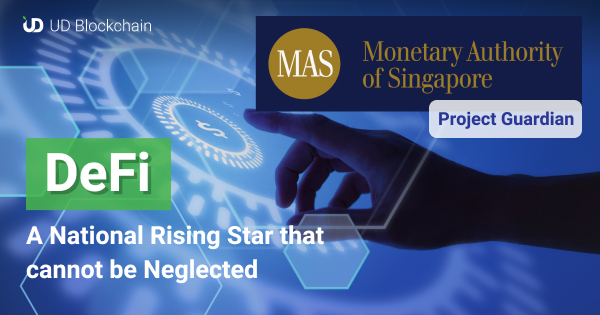Is it the suitable timing to let DeFi globalize?
Focusing on DeFi, the previous two articles introduced the decentralized nature of the blockchain and how DeFi can innovate the financial market. As might be expected, some people will still have the following thoughts: “I am fine with the traditional financial and am not interested in DeFi – though it’s good”;“I know nothing about DeFi and there is no need to get involved in it”;“These technological products are not officially recognized. No one could seek help in any emergency.” All the thoughts above include some established ideas: “we still have room to refuse these innovative technologies, which are not legitimized.”
Singapore's “Project Guardian” proves these ideas wrong.
An official DeFi project
On 2 November 2022, the Monetary Authority of Singapore (MAS) announced that Project Guardian, its project exploring decentralized finance applications in wholesale funding markets, has completed its first live trades.
The trades were conducted under Project Guardian’s first industry pilot which saw DBS, JP Morgan, and SBI Digital Asset Holdings conduct a live cross-currency transaction with tokenized JPY and SGD deposits. Different blockchain technology was adopted:
- - Polygon was chosen because of its cheap gas fees;
- - Aave was utilized for setting certain parameters such as interest rate and fx rates;
- - Used W3C Verifiable Credentials (VC) to provide much more ‘fine-grained’; control, including risk limits, asset limits, etc., instead of mere allow-listing addresses;
- - Developed an institutional wallet to ensure traders cannot access company funds
Direct trading among participants
A live cross-currency transaction involving tokenized JPY and SGD deposits was successfully conducted, MAS says, adding that a simulated exercise was performed involving the buying and selling of tokenized government bonds. The live transactions executed under the first pilot demonstrate that cross currency transactions of tokenized assets can be traded, cleared, and settled instantaneously among direct participants.
Besides, MAS also announced the launch of two new industry pilots in the areas of trade finance and wealth management. The first pilot, which involves Standard Chartered Bank, aims to digitize the trade distribution market by transforming trade assets into transferable instruments; the second involves HSBC and UOB working with digital markets infrastructure provider Marketnode to enable native digital issuance of wealth management products.
Learning from the Singapore example
The settings of ‘Project Guardian’ clearly reveal the enthusiasm of Singapore towards DeFi: to grab the chance at the first stage and innovate the traditional practices. The successful case of Singapore, undoubtedly, will become a role model for other authorities when developing their DeFi plan.
In October 2022, the HKSAR Government issued a policy statement on the development of virtual assets (VA). The release of this policy statement shows that the government, after years of struggle, turns on the green light for virtual assets. It can also be assumed that the official will further push the development of the eco-system consisting of virtual assets exchanges, DeFi, etc., to gain back its role as the top international financial center.
How can enterprises benefit from the DeFi trend? Stay tuned for the updates.





